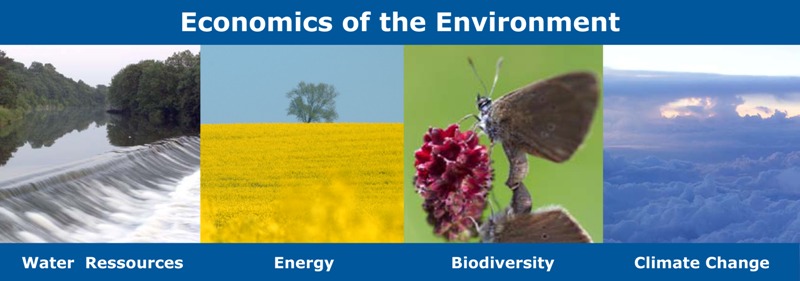
Research Topics of the Department of Economics
Our Topics
Economic water research at UFZ aims at a sustainable management of water resources and aquatic ecosystems. In close cooperation with jurists, hydrologists, limnologists and other water scientists we develop concepts and methods to address and solve serious global, but also specific European and German water related problems. Therefore the institutional settings are analysed, economic as well as alternative assessment methods applied and economic instruments developed within the context of a comprehensive governance perspective.
Energy economic research at UFZ is closely connected with the environmental and sustainability aspects of energy policy. Our applied research specifically focuses on the current challenges of both Germany’s Energiewende and European energy policy. We analyze energy and environmental policy from an economic perspective and within the context of a world characterized by the simultaneity of various political goals, multiple market failures, institutional path dependencies and politico-economic restrictions of regulation.
Economic biodiversity research at UFZ investigates different forms of land use and their impacts on biodiversity and ecosystem services provision. It focusses on economic-ecological modelling, the valuation of environmental goods and services as well as challenges regarding policy instrument choice and design to promote sustainable land use. Based on insights of behavioural economics and governance reserach we derive recommendations particularly for the transformation of agricultural systems.
Our climate economic research deals with the challenges of climate mitigation and adaptation at different levels (local – regional – global) and develops concepts as well as methods for the integration of different sectors and scales. We currently focus on the economic assessment of climate risks and management strategies to cope with them, the development of integrated concepts for climate mitigation and adaptation in urban areas and the analysis of international negotiations on climate mitigation and disaster risk reduction.
Our research is inter- and transdisciplinary. Within UFZ we cooperate closely e.g. with the departments of Environmental and Planning Law, Urban and Environmental Sociology and Environmental Policy as well as the Climate Office for Central Germany. Furthermore, we participate in the Helmholtz Climate Initiative Reklim and the Urban Climate Change Research Network.
Our Methods
What is the social value of environmental goods and ecosystem services? Economic valuation is concerned with the development and application of processes that contribute to decision-making in conflict scenarios between the protection and the economic use of nature and the environment by assigning environmental goods an economic value. Such processes are characterized by the fact that they systematically record the complexity of conflicts concerning the use of the environment through an integrated and multi-dimensional analysis of the ecological, economic and social systems, which illustrate system dynamics using models that incorporate long-term effects through scenario analyses and developed to take into account the uncertainties concerning effects and alternative forms of action. Moreover, these appraisal processes are developed in cooperation with the stakeholders and decision-makers concerned. Both cost-benefit and multi-criteria analyses are conducted and methodically developed.
By using environmental and institutional economic analysis of the instruments used in policies on the environment and natural resources, not only regulatory law and free market instruments such as environmental protection taxes or tradable environmental rights but also co-operative solutions (e.g. voluntary environmental agreements) are given prominence.
Particular weighting is also given to the institutional design of instruments, the analysis of policy-mix structures and implementation questions as well as the innovation effects from the range of instruments. Through a close co-operation between natural and social sciences at the UFZ, integrated approaches can also be developed for the instrumentation concept.
The fields of application cover: taxes, contributions, fees and prices in the areas of energy, water and nature protection, compensation payments for ecological services, ecological fiscal transfers, tradable water allowances, emissions trading, feed-in tariffs for renewable energies, allowances for the designation of building land, habitat trading, the regulation of chemicals and special instruments for bioenergy policies (i.e. tariffs, quotas, certification).
Analyses on the efficiency and the effectiveness of instruments and strategies for the protection of natural resources and biodiversity often require an integration of economic and ecological knowledge. A more useful methodical approach for this integration is ecological-economic modeling. In co-operation with ecologists, research work takes place on three levels:
- With the help of conceptional models, interactions between various ecological and economic variables are examined on an abstract level in the instrumentation concept for bioenergy policies and biodiversity protection.
- Applied models refer to the analysis of a concrete protection issue, for example a cost-efficient design of compensation payments for measures to protect an endangered species in a particular region or the preservation of certain land use patterns.
- The applied models serve at the same time as a basis for the development of decision support systems for decision-makers in the form of software tools.
According to which stakeholders and rules are in fact scarce environmental resources disposed of in society and how should the decision-making and procedures of institutions be designed instead? The economic contributions to the analysis of environment-related institutions and governance processes are based on approaches from public economics (e.g. the theory of public goods, the theory of federalism, public choice theory) as well as on concepts of new institution economics (i.e. economic analysis of law, social contract theory, property rights theory, transaction cost economics) as well as game theory. Prominence is given to questions of environment-related decision-making in a multi-level system as well as at the interface between the supply of private and public goods. A special consideration is given to the characteristics of natural resources (e.g. homogeneity, irreversibility) in their interrelation with institutional regulations.
